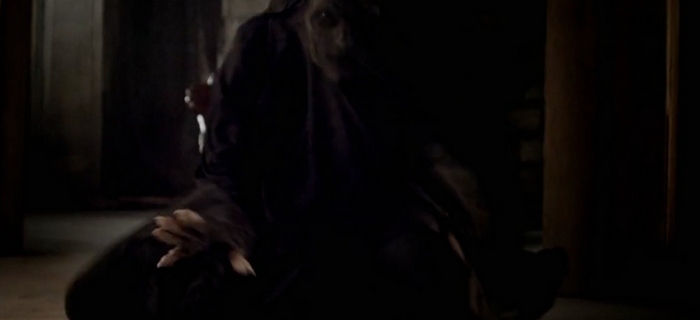
Hamad wrote, "The gimmicky nature of the film is undeniable, relying on the jump-in-your-seat sort of shockers rather than really messing with its viewers’ psyches. Marwa Hamad, reviewing for Gulf News, wrote that the film's use of djinns was a welcome change from traditional horror narratives. Doyle concluded, " Djinn represents, in the end, a fundamental failure to capitalize on the chance for a particularly culturally-rooted new breed of horror film." He found Tully's script to be "insistently uninventive" in reusing common horror elements. Ronan Doyle at Indiewire also panned the film, "From its very first frame, expounding exposition over a shoddily-shot desert sequence, this is an unmitigated disaster of a movie, every bit as horrible as the events it attempts to portray." Doyle wrote the film was a disappointment "tonally as well as technically". He also said that Djinn was not redeemed by either its cinematography or editing. Hooper's lack of engagement isn't helped by unimaginative f/x and leaden dialogue." Weissberg did not find the film scary due to its recycling of the elements and thought that characterization was nonexistent. The critic wrote, "This limp attempt at local horror takes elements from Rosemary's Baby, The Grudge, and others, thrown together into a cheesy, ham-fisted ghost story. Jay Weissberg at Variety said Djinn looked "outright bad" for a film by Hooper. The film premiered at the Abu Dhabi Film Festival on October 25, 2013. Sales for Djinn were launched at the 63rd Berlin International Film Festival in February 2013 and continued at the 2013 Cannes Film Festival the following May. Image Nation's CEO Michael Garin denied these reasons and blamed the delay on meeting the Directors Guild of America's requirements. The paper reported that unofficial reasons included people related to Abu Dhabi's royal family finding the film "to be politically subversive", horror films being "seen as totally foreign, culturally speaking" in the United Arab Emirates, and local pride that led to "rewrites and restructuring". In December 2012, The Guardian covered the film's delay and cited multiple reasons. The National reported in January 2012 that a website said that Image Nation turned down two distribution offers, but Image Nation denied this and said the film took longer than expected in post-production. The studio promised a theatrical release in early 2012 then in mid-2012 neither release transpired.

It was offered "a red-carpet premiere" at the 2011 Dubai International Film Festival but was not screened at the festival. The film had a test screening in December 2011 in London, which 300 moviegoers attended. In February 2011 Fortissimo Films acquired the right to represent international sales for Image Nation's films, including Djinn. By late August 2011, the film was in post-production.

In Al Jazira Al Hamra, the cast and crew avoided using the word "djinn" and also taped over the film's title on the director's chair.

The subject matter was treated with caution so it would not offend local values in the different towns where filming took place. With a production budget of US$5 million, filming began in the United Arab Emirates in late March 2011 and took place at several locations throughout Dubai. The screenwriter learned about local stories told in the region. Tully came up with the premise for Djinn when an Emirati friend brought him to a village similar to the one in the film. He said Djinn had minimal gore, similar to Hooper's previous films The Texas Chain Saw Massacre (1974) and Poltergeist (1982). Tully said films about the djinn were very uncommon, only recalling Wishmaster (1997). The film is the first supernatural thriller film in both English and Arabic languages. Emirati director Nayla Al Khaja joined the project as a cultural consultant. The project was set up by Imagenation Abu Dhabi (now Image Nation) in February 2011. Djinn is directed by Tobe Hooper based on a screenplay by David Tully.


 0 kommentar(er)
0 kommentar(er)
